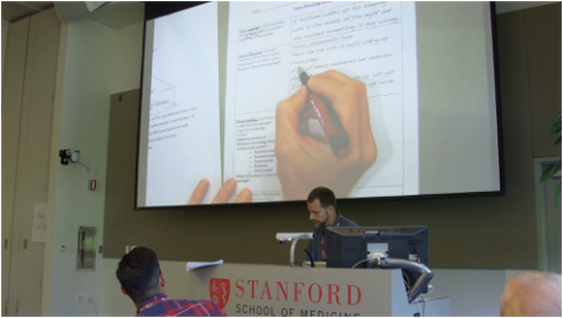Language, Identity, and Learning
My research examines how English teachers balance the academic and social roles of language and the impact on learning for students from diverse language backgrounds.
For too long schools have told students who speak stigmatized varieties of English, such as African-American English and Southern English, that their language is improper, incorrect, or inappropriate. In fact, linguistic research over the last 60 years has thoroughly documented the systematic and rule bound nature of all English varieties. Hence, all English varieties are "correct" and follow their own grammar rules with as much linguistic validity as Standardized English. The prestige and stigma attached to certain English varieties is a form of linguistic prejudice with negative consequences for students' school experiences.
I study how teachers in middle and high school English classrooms approach teaching about language in ways that include rather than exclude student voices, and that generate new knowledge about the evolving nature of language in our linguistically pluralistic society.
I study how teachers in middle and high school English classrooms approach teaching about language in ways that include rather than exclude student voices, and that generate new knowledge about the evolving nature of language in our linguistically pluralistic society.
Peer reviewed articles
- Metz, M. (2022) Applying a critical language lens: Analyzing language use in everyday video texts. Journal of Adolescent & Adult Literacy, 65(5) 409-417. accessible online version
- Metz, M. & Knight, H. (2021) The Dominant School Language Narrative: Unpacking English Teachers’ Language Ideologies. Language. 97(3) e238-e256. DOI: 10.1353/lan.2021.0041
- Metz, M. (2021). Ideology, identity, and pedagogy in English language arts teachers’ linguistic styling in U.S. classrooms. Linguistics and Education, 64, https://doi.org/10.1016/j.linged.2021.100942
- Metz, M. (2020). Amplifying academic talk: High-quality discussions in the language of comfort. English Journal, 109(4), 55–61.
- Metz, M., Kavanagh, S. S., & Hauser, M. (2020). Developing adaptive expertise in facilitating text-based discussions: Attending to generalities and novelty. English Education, 52(4), 310–334.
- Kavanagh, S. S., Metz, M., Hauser, M., Fogo, B., Taylor, M. W., & Carlson, J. (2020). Practicing Responsiveness: Using Approximations of Teaching to Develop Teachers’ Responsiveness to Students’ Ideas. Journal of Teacher Education, 0022487119841884. https://doi.org/10.1177/0022487119841884
- Metz, M. (2019). Accommodating linguistic prejudice? Examining English teachers’ language ideologies. English Teaching: Practice & Critique. https://doi.org/10.1108/ETPC-09-2018-0081
- Metz, M. (2018) Challenges of confronting dominant language ideologies in the high school English classroom. Research in the Teaching of English, 52(4).
- Metz, M. (2018) The Role of Teacher Educator’s Personal Histories and Motivations in Shaping Opportunities to Learn about Social Justice. Teachers College Record, 120(7).
- Metz, M. (2018). Exploring the complexity of high school students’ beliefs about language variation. Linguistics and Education, 45, 10–19. https://doi.org/10.1016/j.linged.2018.02.003
- Metz, M. (2018). Pedagogical Content Knowledge for Teaching Critical Language Awareness: The Importance of Valuing Student Knowledge. Urban Education. https://doi.org/10.1177/0042085918756714
- Metz, M. (2017). Addressing English teachers’ concerns about decentering Standard English. English Teaching: Practice & Critique, 16(3), 363–374. https://doi.org/10.1108/ETPC-05-2017-0062
